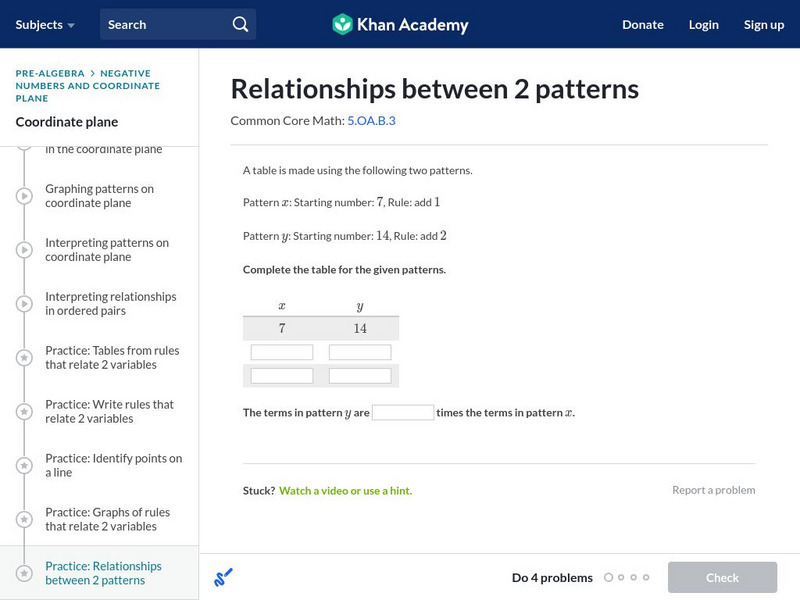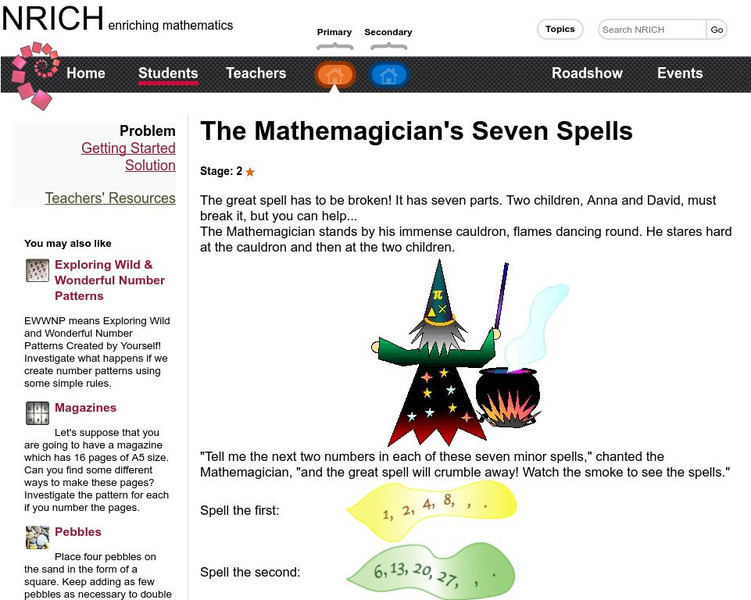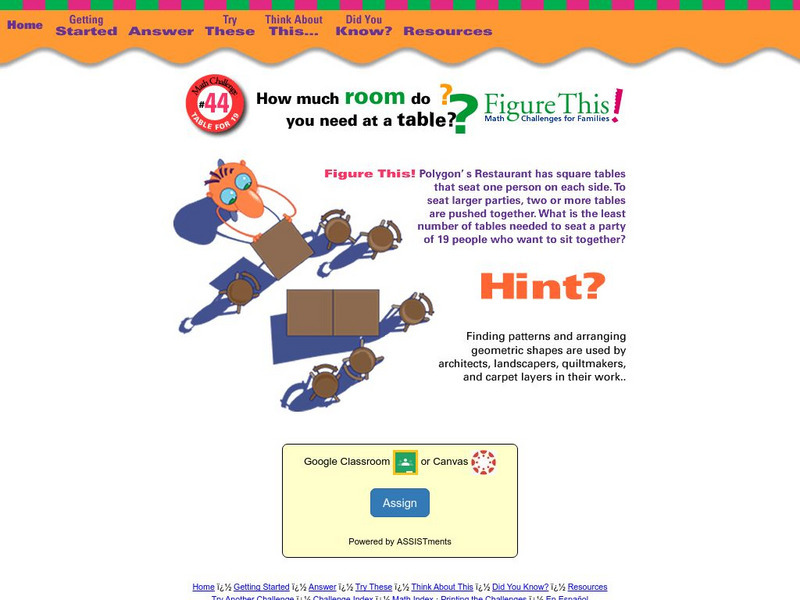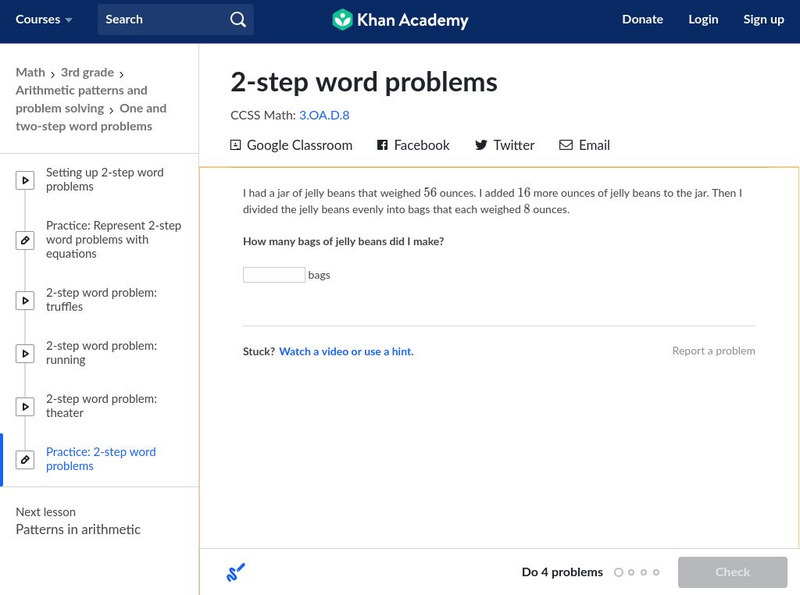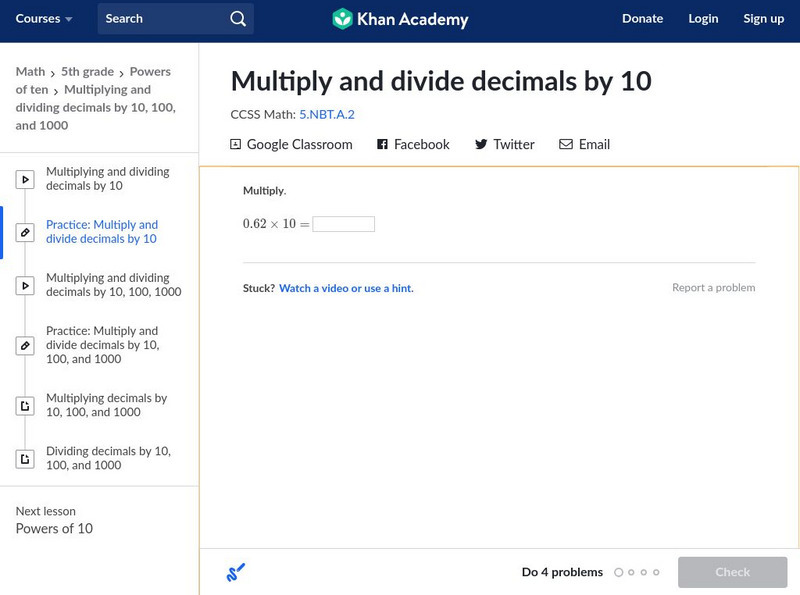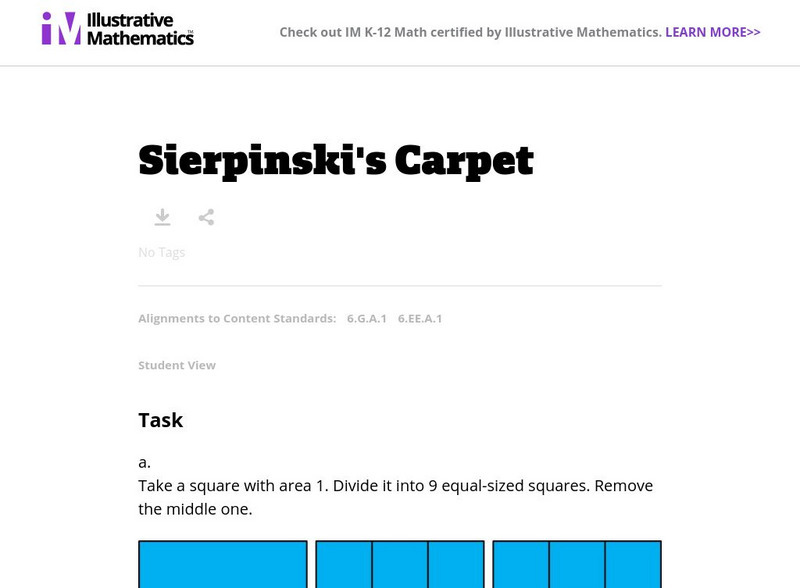Khan Academy
Khan Academy: Math Patterns 2
Generate terms in a pattern when given a rule. Identify features of a pattern that are not explicit to the rule itself. Students receive immediate feedback and have the opportunity to try questions repeatedly, watch a video or receive...
Better Lesson
Better Lesson: Using a Pattern to Solve a Problem
Patterns are prevalent in all levels of math. Common Core Standards expect students to be able to use structure - like that found in repeating the patterns of odd and even numbers or counting by 5s or 10s - to solve problems (MP7).
E-learning for Kids
E Learning for Kids: Math: Singing Angels: Multiplications and Patterns
Use these interactive activities to explore multiplication and patterns.
Khan Academy
Khan Academy: Interpret Relationships Between Patterns
Generate patterns using given rules. Identify relationships between terms. Graph ordered pairs consisting of corresponding terms from the patterns. Students receive immediate feedback and have the opportunity to try questions repeatedly,...
PBS
Pbs Learning Media: Toothpicks: Patterns in Geometric Shapes
This interactive exercise focuses on determining probabilities associated with repeated coin tosses and building tree diagrams to take math out of the classroom and into the real world.
Alabama Learning Exchange
Alex: Musical Patterns
Students will become familiar with the concept of patterning by using musical instruments to repeat and create patterns of sounds.This lesson plan was created as a result of the Girls Engaged in Math and Science, GEMS Project funded by...
E-learning for Kids
E Learning for Kids: Math: Street Orchestra: Odd and Even Numbers
Use these interactive lessons to explore counting forward.
University of Cambridge
University of Cambridge: Nrich: Mathemagician's Seven Spells
See if you can find the pattern in the sequence of numbers that will break the Mathemagician's spell. The solution is available at this one page website. After you find your solution you can check it.
Other
Math Stories: Finding a Pattern
At this one page site, you can work through step by step a sample problem that illustrates the problem-solving strategy for "identify a pattern." The answer is right there to help you check your thinking.
National Council of Teachers of Mathematics
Nctm: Figure This: Table for 19 (Pdf)
The waiters at Polygon's Restaurant need your help. See if you can use your problem solving and patterning skills to help them solve this math challenge. Discover how developing these skills could be useful in real life situations, in...
National Council of Teachers of Mathematics
Nctm: Figure This: Fractals
Can you figure out what pattern comes next? Explore patterns and perimeter in this math challenge on fractals. A one page activity from the NCTM Math Challenges for Families collection.
Math2
Math2.org: Trigonometry Tables
Three trig tables are provided for student and teacher reference. The first table lists the sine, cosine, tangent, secant, cosecant, and cotangent values of all whole-number angles from 0 to 90. The radian equivalent (to four decimals)...
Khan Academy
Khan Academy: 2 Step Word Problems
Solve two-step word problems with addition, subtraction, multiplication, and division. Some questions include estimation. Students receive immediate feedback and have the opportunity to try questions repeatedly, watch a video or receive...
University of Cambridge
University of Cambridge: Nrich: Ice Cream
Sharpen your logic and pattern creation skills performing this fun game. Includes solution.
Other
Fractal Explorer
The fractal explorer shows how a very simple pattern, when repeated can produce an incredible range of images. From organic tree like structures to rigid geometric forms. Fun to use and lots of mathematical concepts involved.
Khan Academy
Khan Academy: Multiply and Divide Decimals by 10
Practice multiplying and dividing decimal numbers by 10. Students receive immediate feedback and have the opportunity to try questions repeatedly, watch a video or receive hints.
Khan Academy
Khan Academy: Multiplying and Dividing by Powers of 10
In this exercise, students practice multiplying and dividing by powers of 10. Students receive immediate feedback and have the opportunity to get hints and try questions repeatedly.
Khan Academy
Khan Academy: Describing Trends in Scatter Plots
Practice making sense of trends in scatter plots. That is, explain what trends mean in terms of real-world quantities. Students receive immediate feedback and have the opportunity to try questions repeatedly, watch a video, or receive...
Illustrative Mathematics
Illustrative Mathematics: 6.ee,g Sierpinski's Carpet
In this task, 6th graders are presented with a large square divided into 9 squares and the center square is then removed. They are asked to find the area of the 8 remaining squares. Each smaller square is divided in the same way and the...
Better Lesson
Better Lesson: Let's Review
Revisit, Revisit, Revisit! Students need repeated exposure to math concepts to really understand how they work.
University of Cambridge
University of Cambridge: Nrich: Building Stars
This interactive activity gives you an opportunity to color in a tessellation that is different from the usual. Read the short introduction to find out more about this tessellation that doesn't repeat.
University of Cambridge
University of Cambridge: Nrich: Star Find
This one page website offers two interesting tiling problems. The solution is provided here as well.
Khan Academy
Khan Academy: Count Objects 2
Practice counting up to 20 objects in random patterns. Students receive immediate feedback and have the opportunity to try questions repeatedly, watch a video or receive hints.
PBS
Pbs: Negative Exponents as Fractals
Determine the relationship between graphic patterns and what they represent mathematically. This video focuses on how fractals can be a visual representation of negative exponents, which are a way to express repeated division.





